名词性从句
什么叫名词性从句
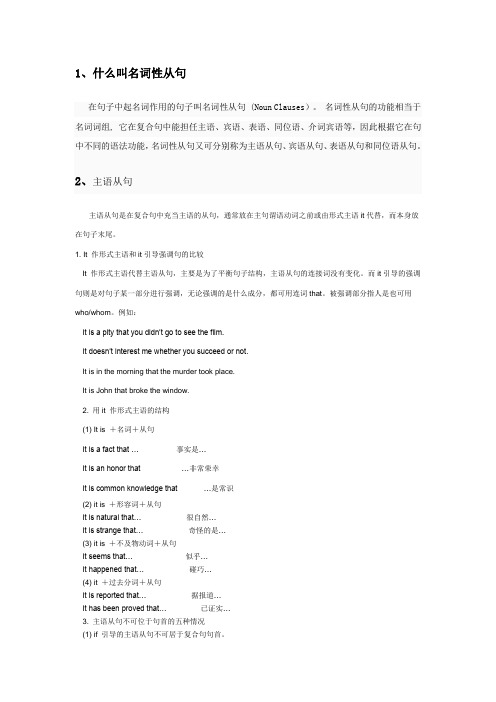
1、什么叫名词性从句在句子中起名词作用的句子叫名词性从句 (Noun Clauses)。
名词性从句的功能相当于名词词组, 它在复合句中能担任主语、宾语、表语、同位语、介词宾语等,因此根据它在句中不同的语法功能,名词性从句又可分别称为主语从句、宾语从句、表语从句和同位语从句。
2、主语从句主语从句是在复合句中充当主语的从句,通常放在主句谓语动词之前或由形式主语it代替,而本身放在句子末尾。
1. It 作形式主语和it引导强调句的比较It 作形式主语代替主语从句,主要是为了平衡句子结构,主语从句的连接词没有变化。
而it引导的强调句则是对句子某一部分进行强调,无论强调的是什么成分,都可用连词that。
被强调部分指人是也可用who/whom。
例如:It is a pity that you didn’t go to see the film.It doesn’t interest me whether you succeed or not.It is in the morning that the murder took place.It is John that broke the window.2. 用it 作形式主语的结构(1) It is +名词+从句It is a fact that … 事实是…It is an honor that …非常荣幸It is common knowledge that …是常识(2) it is +形容词+从句It is natural that… 很自然…It is strange that… 奇怪的是…(3) it is +不及物动词+从句It seems that… 似乎…It happened that… 碰巧…(4) it +过去分词+从句It is reported that… 据报道…It has been proved that… 已证实…3. 主语从句不可位于句首的五种情况(1) if 引导的主语从句不可居于复合句句首。
名词性从句讲解(最全版)
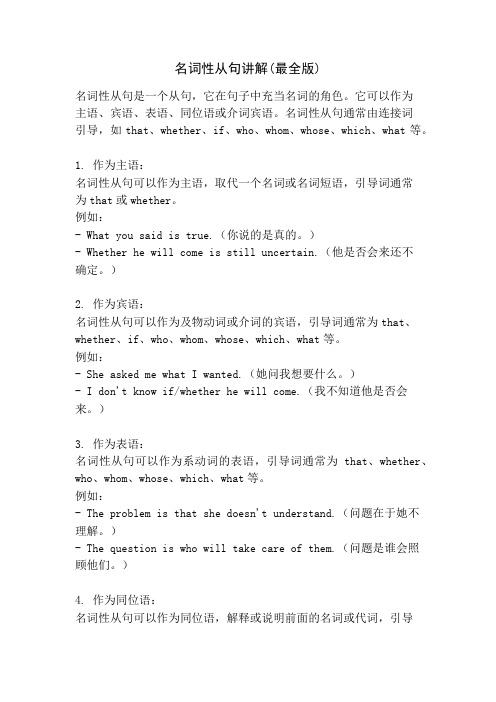
名词性从句讲解(最全版)名词性从句是一个从句,它在句子中充当名词的角色。
它可以作为主语、宾语、表语、同位语或介词宾语。
名词性从句通常由连接词引导,如that、whether、if、who、whom、whose、which、what等。
1. 作为主语:名词性从句可以作为主语,取代一个名词或名词短语,引导词通常为that或whether。
例如:- What you said is true.(你说的是真的。
)- Whether he will come is still uncertain.(他是否会来还不确定。
)2. 作为宾语:名词性从句可以作为及物动词或介词的宾语,引导词通常为that、whether、if、who、whom、whose、which、what等。
例如:- She asked me what I wanted.(她问我想要什么。
)- I don't know if/whether he will come.(我不知道他是否会来。
)3. 作为表语:名词性从句可以作为系动词的表语,引导词通常为that、whether、who、whom、whose、which、what等。
例如:- The problem is that she doesn't understand.(问题在于她不理解。
)- The question is who will take care of them.(问题是谁会照顾他们。
)4. 作为同位语:名词性从句可以作为同位语,解释或说明前面的名词或代词,引导词通常为that、whether、who、whom、whose、which、what等。
例如:- The fact that he lied surprised me.(他撒谎的事实让我感到惊讶。
)- His belief that she will succeed is unwavering.(他坚信她会成功。
名词性从句
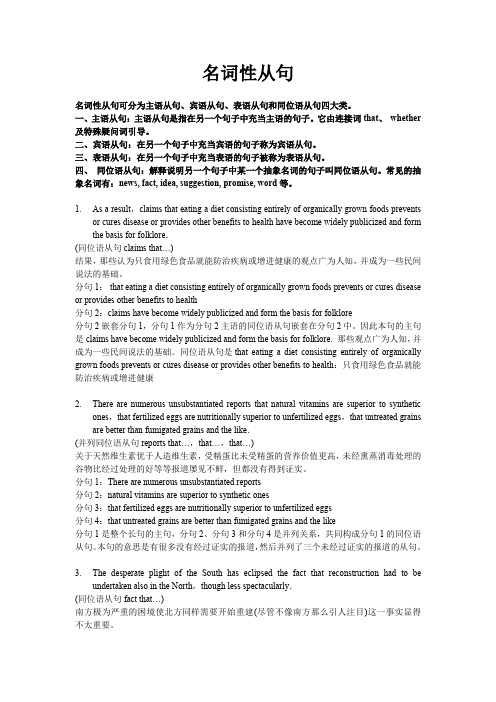
名词性从句名词性从句可分为主语从句、宾语从句、表语从句和同位语从句四大类。
一、主语从句:主语从句是指在另一个句子中充当主语的句子。
它由连接词that、whether 及特殊疑问词引导。
二、宾语从句:在另一个句子中充当宾语的句子称为宾语从句。
三、表语从句:在另一个句子中充当表语的句子被称为表语从句。
四、同位语从句:解释说明另一个句子中某一个抽象名词的句子叫同位语从句。
常见的抽象名词有:news, fact, idea, suggestion, promise, word等。
1.As a result,claims that eating a diet consisting entirely of organically grown foods preventsor cures disease or provides other benefits to health have become widely publicized and form the basis for folklore.(同位语从句claims that…)结果,那些认为只食用绿色食品就能防治疾病或增进健康的观点广为人知,并成为一些民间说法的基础。
分句1:that eating a diet consisting entirely of organically grown foods prevents or cures disease or provides other benefits to health分句2:claims have become widely publicized and form the basis for folklore分句2嵌套分句1,分句1作为分句2主语的同位语从句嵌套在分句2中。
因此本句的主句是claims have become widely publicized and form the basis for folklore. 那些观点广为人知,并成为一些民间说法的基础。
名词性从句

语序:陈述语序
在句中充当主语的从句称为主语 从句。英语中主语从句的句型可分 为两大类: 直接将主语从句放在主语位置上; 用it作形式主语,将真正的主语从 句后移,放在其他成分后。
让我们先说说第一类吧!
一、连接词(只起连接作用,在从句中不充当句子成分)
that:无词义。 e.g.: 他赢得比赛一事在我国引起巨大轰动。 That he won the game made a tremendous stir in our country. whether:“是否”。可单独使用,也可与or或or not连用。 e.g.: 我们明天是否能去春游取决于天气。 Whether we can go for a spring outing depends on the weather. 他们是否会来还未告诉我们。 Whether they will come has not been told to us.
四、主语从句与主谓一致
一个从句作主语时,谓语动词通常用单数形式, 特别是用it作形式主语的句型。 e.g.: Whether this kind of chemicals is better has not been tried.
当what引导主从,应遵循意义一致原则,谓语动 词选用相应形式。表语是复数时,谓语动词用复数 形式。 e.g.: What we do willingly is easy. What they were searching for were the missing gems.
Introduction
名词性从句:包括四种:主语从句、表语从句、宾语从
句、同位语从句。
连词:引导名词性从句的连词有以下三类
连接词:只起连接作用,在从句中不充当句子成分; 连接代词:连接主从句,并在从句中作主语/宾语/表 语/定语; 连接副词:连接主从句,并在从句中作时状/地状/原 因状/方式状。
名词性从句
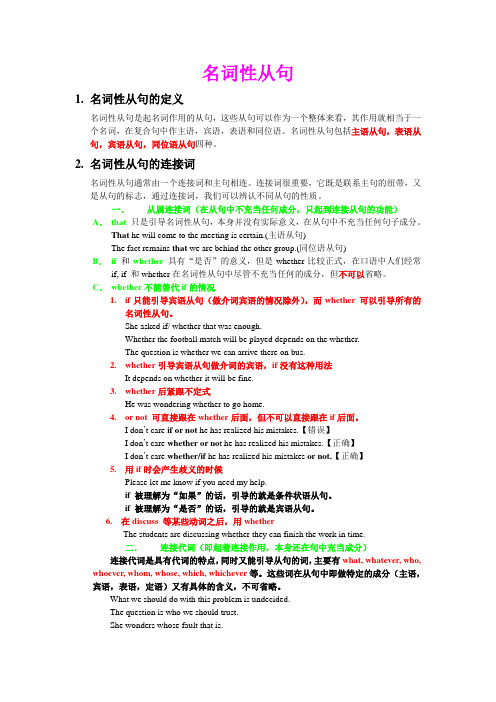
名词性从句1.名词性从句的定义名词性从句是起名词作用的从句,这些从句可以作为一个整体来看,其作用就相当于一个名词,在复合句中作主语,宾语,表语和同位语。
名词性从句包括主语从句,表语从句,宾语从句,同位语从句四种。
2.名词性从句的连接词名词性从句通常由一个连接词和主句相连。
连接词很重要,它既是联系主句的纽带,又是从句的标志,通过连接词,我们可以辨认不同从句的性质。
一.从属连接词(在从句中不充当任何成分,只起到连接从句的功能)A.that 只是引导名词性从句,本身并没有实际意义,在从句中不充当任何句子成分。
That he will come to the meeting is certain.(主语从句)The fact remains that we are behind the other group.(同位语从句)B.if和whether具有“是否”的意义,但是whether比较正式,在口语中人们经常if, if 和whether在名词性从句中尽管不充当任何的成分,但不可以省略。
C.whether不能替代if的情况1.if只能引导宾语从句(做介词宾语的情况除外),而whether 可以引导所有的名词性从句。
She asked if/ whether that was enough.Whether the football match will be played depends on the whether.The question is whether we can arrive there on bus.2.whether引导宾语从句做介词的宾语,if没有这种用法It depends on whether it will be fine.3.whether后紧跟不定式He was wondering whether to go home.4.or not 可直接跟在whether后面,但不可以直接跟在if后面。
名词性从句(整理完整版)
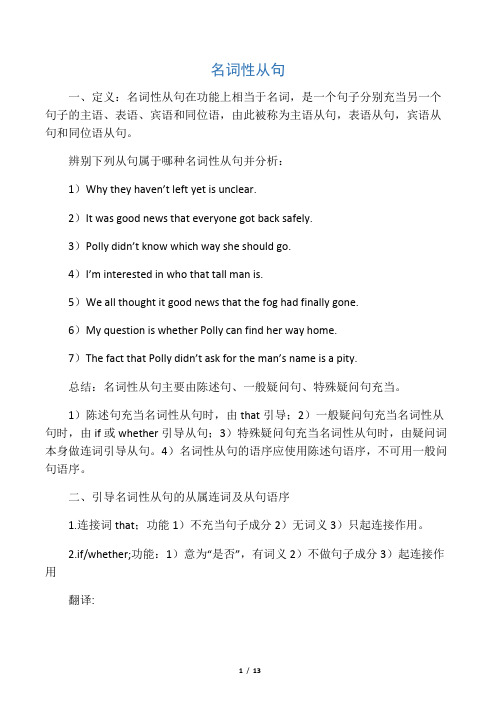
名词性从句一、定义:名词性从句在功能上相当于名词,是一个句子分别充当另一个句子的主语、表语、宾语和同位语,由此被称为主语从句,表语从句,宾语从句和同位语从句。
辨别下列从句属于哪种名词性从句并分析:1)Why they haven’t left yet is unclear.2)It was good news that everyone got back safely.3)Polly didn’t know which way she should go.4)I’m interested in who that tall man is.5)We all thought it good news that the fog had finally gone.6)My question is whether Polly can find her way home.7)The fact that Polly didn’t ask for the man’s name is a pity.总结:名词性从句主要由陈述句、一般疑问句、特殊疑问句充当。
1)陈述句充当名词性从句时,由that引导;2)一般疑问句充当名词性从句时,由if或whether引导从句;3)特殊疑问句充当名词性从句时,由疑问词本身做连词引导从句。
4)名词性从句的语序应使用陈述句语序,不可用一般问句语序。
二、引导名词性从句的从属连词及从句语序1.连接词that;功能1)不充当句子成分2)无词义3)只起连接作用。
2.if/whether;功能:1)意为“是否”,有词义2)不做句子成分3)起连接作用翻译:1)I know that he will come thisevening.___________________________________________2) Whether we will go there or not hasn’t been decided yet.______________________________3.连接代词:what(ever), which(ever), who(ever), whom(ever), whose(ver)功能:1)有词义2)引起从句3)且在从句中充当一定的句子成分,常做从句中的主语、宾语、表语和定语。
名词性从句
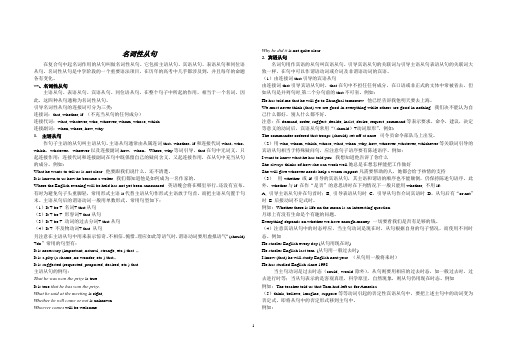
名词性从句在复合句中起名词作用的从句叫做名词性从句。
它包括主语从句、宾语从句、表语从句和同位语从句。
名词性从句是中学阶段的一个重要语法项目,在历年的高考中几乎都涉及到,并且每年的命题各有变化。
一、名词性从句主语从句、表语从句、宾语从句、同位语从句,在整个句子中所起的作用,相当于一个名词。
因此,这四种从句通称为名词性从句。
引导名词性从句的连接词可分为三类:连接词:that, whether, if (不充当从句的任何成分)连接代词:what, whatever, who, whoever, whom, whose, which.连接副词:when, where, how, why1.主语从句作句子主语的从句叫主语从句。
主语从句通常由从属连词that,whether,if和连接代词what,who,which,whatever,whoever以及连接副词how,when,Where, why等词引导。
that在句中无词义,只起连接作用;连接代词和连接副词在句中既保留自己的疑问含义、又起连接作用,在从句中充当从句的成分。
例如:What he wants to tell us is not clear. 他要跟我们说什么,还不清楚。
It is known to us how he became a writer. 我们都知道他是如何成为一名作家的。
Where the English evening will be held has not yet been announced. 英语晚会将在哪里举行,还没有宣布。
有时为避免句子头重脚轻,常用形式主语it代替主语从句作形式主语放于句首,而把主语从句置于句末。
主语从句后的谓语动词一般用单数形式。
常用句型如下:(1)It + be + 名词+ that从句(2)It + be + 形容词+ that从句(3)It + be + 动词的过去分词+ that从句(4)It + 不及物动词+ that 从句另注意在主语从句中用来表示惊奇、不相信、惋惜、理应如此等语气时,谓语动词要用虚拟语气“(should) +do”常用的句型有:It is necessary (important, natural, strange, etc.) that …It is a pity (a shame, no wonder, etc.) that…It is suggested (requested, proposed, desired, etc.) that主语从句的例句:That he was won the prize is true.It is true that he has won the prize.What he said at the meeting is right,Whether he will come or not is unknown.Whoever comes will be welcome. Why he did it is not quite clear.2. 宾语从句名词句用作宾语的从句叫宾语从句。
名词性从句
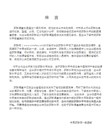
D.引导同位语从句时,切不可错用which。例如:
Word has come that some American guests will come to visit our school next week. 有消息说下周将有一些美国客人来我校参观。
____ you have seen both fighters, ____ will win?
A. Since; do you think who B. As; who you think
C. When; whoever D. Since; who do you think
解析:根据上面的讲解,不难知道答案是D。其中do you think是插入成分,其余部分是宾语从句,作think的宾语;由于引导词在从句中作主语,所以要用主格who(不用whom)。
-I drove to Zhuhai for the air show last week.
-Is that ____ you had a few days off?
A. why B. when C. that D. where
解析:答案是A,why引导的从句作表语,同时why在从句中作原因状语。这里之所以选why,而不是when或 where等,唯一的依据便是句子的逻辑含义,及语境。
whatever,whoever,whichever引导名词性从句
一、基本用法概说英语中的-ever 词主要包括 whatever, whoever, whichever, whenever, wherever, however 等,其中可引导名词性从句的主要有 whatever, whoever, whichever等,其中可引导Roman'; mso-ascii-font-family: 'Times New Roman'">。这里所说的名词性从句主要指主语从句和宾语从句,它们通常不用于引导同位语从句,同时也很少用于引导表语从句。如:Whatever he said was right. 无论他说什么都是对的。(引导主语从句)I don’t believe whatever he said. 无论他说什么我都不信。(引导宾语从句)在某些特定的语境中,也可用于引导表语从句。如:
什么是名词性从句
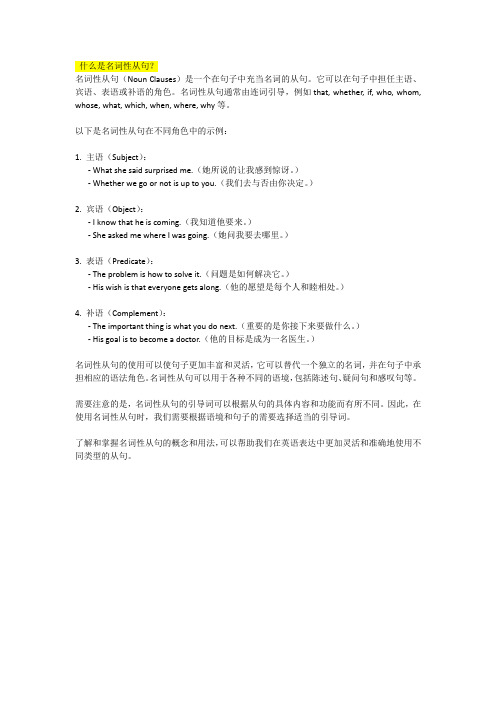
什么是名词性从句?名词性从句(Noun Clauses)是一个在句子中充当名词的从句。
它可以在句子中担任主语、宾语、表语或补语的角色。
名词性从句通常由连词引导,例如that, whether, if, who, whom, whose, what, which, when, where, why等。
以下是名词性从句在不同角色中的示例:1. 主语(Subject):- What she said surprised me.(她所说的让我感到惊讶。
)- Whether we go or not is up to you.(我们去与否由你决定。
)2. 宾语(Object):- I know that he is coming.(我知道他要来。
)- She asked me where I was going.(她问我要去哪里。
)3. 表语(Predicate):- The problem is how to solve it.(问题是如何解决它。
)- His wish is that everyone gets along.(他的愿望是每个人和睦相处。
)4. 补语(Complement):- The important thing is what you do next.(重要的是你接下来要做什么。
)- His goal is to become a doctor.(他的目标是成为一名医生。
)名词性从句的使用可以使句子更加丰富和灵活,它可以替代一个独立的名词,并在句子中承担相应的语法角色。
名词性从句可以用于各种不同的语境,包括陈述句、疑问句和感叹句等。
需要注意的是,名词性从句的引导词可以根据从句的具体内容和功能而有所不同。
因此,在使用名词性从句时,我们需要根据语境和句子的需要选择适当的引导词。
了解和掌握名词性从句的概念和用法,可以帮助我们在英语表达中更加灵活和准确地使用不同类型的从句。
名词性从句有哪些
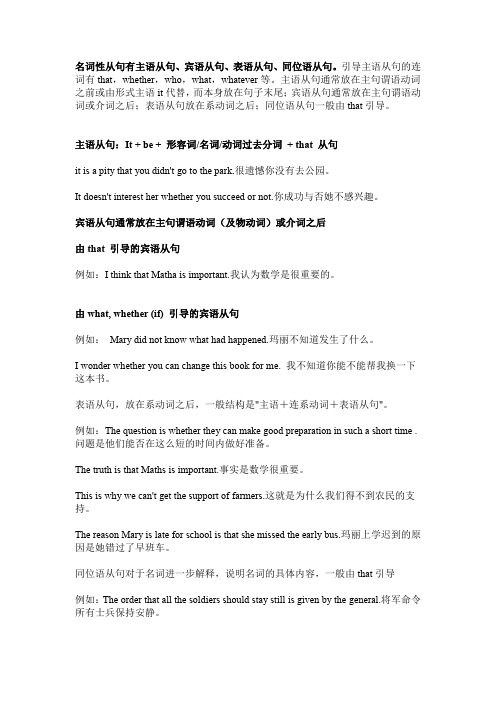
名词性从句有主语从句、宾语从句、表语从句、同位语从句。
引导主语从句的连词有that,whether,who,what,whatever等。
主语从句通常放在主句谓语动词之前或由形式主语it代替,而本身放在句子末尾;宾语从句通常放在主句谓语动词或介词之后;表语从句放在系动词之后;同位语从句一般由that引导。
主语从句:It + be + 形容词/名词/动词过去分词+ that 从句it is a pity that you didn't go to the park.很遗憾你没有去公园。
It doesn't interest her whether you succeed or not.你成功与否她不感兴趣。
宾语从句通常放在主句谓语动词(及物动词)或介词之后由that 引导的宾语从句例如:I think that Matha is important.我认为数学是很重要的。
由what, whether (if) 引导的宾语从句例如:Mary did not know what had happened.玛丽不知道发生了什么。
I wonder whether you can change this book for me. 我不知道你能不能帮我换一下这本书。
表语从句,放在系动词之后,一般结构是"主语+连系动词+表语从句"。
例如:The question is whether they can make good preparation in such a short time .问题是他们能否在这么短的时间内做好准备。
The truth is that Maths is important.事实是数学很重要。
This is why we can't get the support of farmers.这就是为什么我们得不到农民的支持。
The reason Mary is late for school is that she missed the early bus.玛丽上学迟到的原因是她错过了早班车。
名词性从句
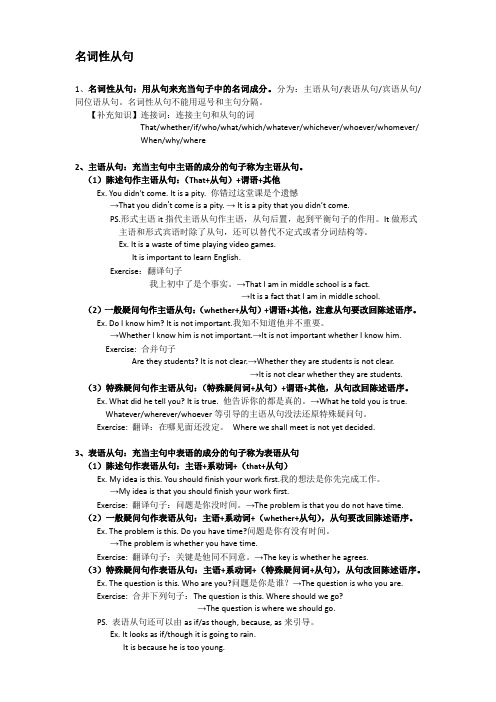
名词性从句1、名词性从句:用从句来充当句子中的名词成分。
分为:主语从句/表语从句/宾语从句/同位语从句。
名词性从句不能用逗号和主句分隔。
【补充知识】连接词:连接主句和从句的词That/whether/if/who/what/which/whatever/whichever/whoever/whomever/When/why/where2、主语从句:充当主句中主语的成分的句子称为主语从句。
(1)陈述句作主语从句:(That+从句)+谓语+其他Ex. You didn't come. It is a pity. 你错过这堂课是个遗憾→That you didn’t come is a pity. → It is a pity that you didn’t come.PS.形式主语it指代主语从句作主语,从句后置,起到平衡句子的作用。
It做形式主语和形式宾语时除了从句,还可以替代不定式或者分词结构等。
Ex. It is a waste of time playing video games.It is important to learn English.Exercise:翻译句子我上初中了是个事实。
→That I am in middle school is a fact.→It is a fact that I am in middle school.(2)一般疑问句作主语从句:(whether+从句)+谓语+其他,注意从句要改回陈述语序。
Ex. Do I know him? It is not important.我知不知道他并不重要。
→Whether I know him is not important.→It is not important whether I know him.Exercise: 合并句子Are they students? It is not clear.→Whether they are students is not clear.→It is not clear whether they are students. (3)特殊疑问句作主语从句:(特殊疑问词+从句)+谓语+其他,从句改回陈述语序。
高中英语语法——名词性从句

①that 引导同位语从句时,是连词,不作成分,只起连接作用,that不能省。 that 引导定语从句时, 是关系代词,作主语或宾语。作宾语时常可以省略。 ②定语从句的先行词可以是任何名词或代词;同位语从句前面的名词必须是 抽象名词,常考的有消息(news/ word/ information/ message)、事实(fact/ truth)、 观点(opinion/ view/ thought/ idea/ belief)、希望(hope/ wish)、问题(question/ problem/ doubt)、请求(request/ requirement/ demand/ desire)、建议(advice/ suggestion/ recommendation/ proposal)、承诺(promise)等。
who/ whoever的区分 whoever强调的是人,who表示疑问谁
_W__h_o_e_v_e_r__ could solve the problem will be rewarded. __W__h_o_____ will solve the proble is unknown. __W__h_o_e_v_e_r_ breaks the law, he will be punished.
名词性从句

•
What he wants to tell us is not clear. 他要
跟我们说什么,还不清楚。
主语从句
• T__h_a_t_ he is a famous singer is known to us. • W__h__a_t happened that night will be never
It is a pity that you (should) miss such a good chance.
表语从句
• 在句中作表语的从句叫表语从句。 • 引导表语从句的关联词与引导主语从句的关联词
大致一样。表语从句有时用as if/ as though 引 导;because也可以引导表语从句。如: • That’s just what I want. • It looks as if it is going to rain. ★ 当主语是reason时,表语从句要用that引导而不 是because。如: • The reason why he was late was that he missed the train by one minute this morning.
7. 动词doubt 如果用于肯定句,其后的宾语从句常用 if/whether引导,如果用于否定句或疑问句,宾语从 句则用that引导。如:
I doubt if/whether our football team will win the match.
I don’t doubt that I can defeat him in the contest.
引导主语从句时,从句位于句首用whether,不用if。 Eg: Whether she likes the present is not clear to me. 她是 否喜欢那件礼物我不清楚。 引导表语从句时,用whether, 不用if。例如: His first question was whether Holmes had arrived yet. 它 的第一个问题是福尔摩斯是否已经到了。
名词性从句
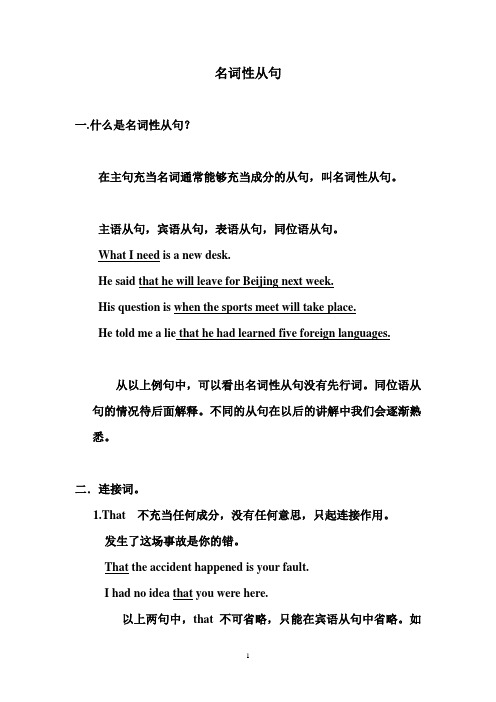
名词性从句一.什么是名词性从句?在主句充当名词通常能够充当成分的从句,叫名词性从句。
主语从句,宾语从句,表语从句,同位语从句。
What I need is a new desk.He said that he will leave for Beijing next week.His question is when the sports meet will take place.He told me a lie that he had learned five foreign languages.从以上例句中,可以看出名词性从句没有先行词。
同位语从句的情况待后面解释。
不同的从句在以后的讲解中我们会逐渐熟悉。
二.连接词。
1.That 不充当任何成分,没有任何意思,只起连接作用。
发生了这场事故是你的错。
That the accident happened is your fault.I had no idea that you were here.以上两句中,that 不可省略,只能在宾语从句中省略。
如果省略的话,句子的意思不清,句子成分也不明。
2.whether, if ( 不做句子成分,有意思,有连接作用)The question is whether the book is worth reading.Whether the pollution can be controlled depends on the effect we will make.以上两句不能用if代替whether.If 只能用于宾语从句,但不能用于介词宾语从句。
He didn’t make sure if (whether)he would take p art in the party.Everything depends on whether we have enough experience.3.连接代词或连接副词(所有疑问代词和疑问副词都可以转为连接代词或连接副词)(做句子成分,有意思,有连接作用。
名词性从句
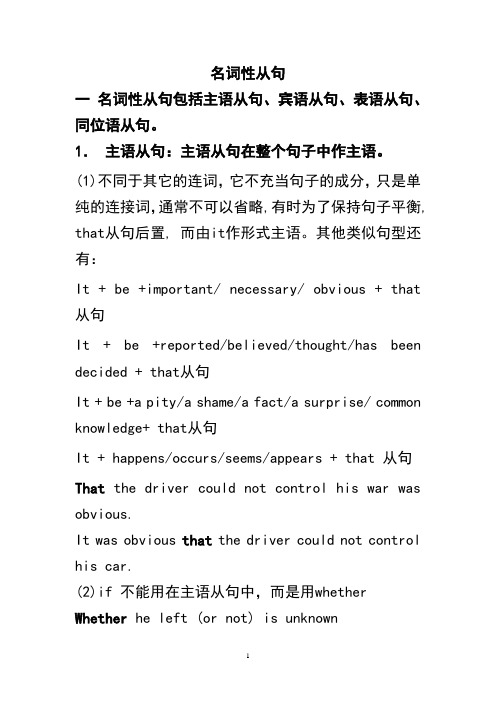
名词性从句一名词性从句包括主语从句、宾语从句、表语从句、同位语从句。
1.主语从句:主语从句在整个句子中作主语。
(1)不同于其它的连词,它不充当句子的成分,只是单纯的连接词,通常不可以省略,有时为了保持句子平衡, that从句后置, 而由it作形式主语。
其他类似句型还有:It + be +important/ necessary/ obvious + that 从句It + be +reported/believed/thought/has been decided + that从句It + be +a pity/a shame/a fact/a surprise/ common knowledge+ that从句It + happens/occurs/seems/appears + that 从句That the driver could not control his war was obvious.It was obvious that the driver could not control his car.(2)if 不能用在主语从句中,而是用whether Whether he left (or not) is unknown(3)当主语从句作主语时,谓语动词一般用第三人称单数What we need is more time and money.What we need are many more books.2.表语从句:表语从句出现在系动词后,充当表语。
其基本结构为: 主语 + 系动词 + that从句。
The trouble is that we are short of money.Go and get your coat. It’s where you left it.3.宾语从句:及物动词,形容词和介词后加宾语从句作其宾语。
(1)宾语从句时态与主句相呼应,但宾语从句表示的是客观真理或普遍现象除外The teacher told us that the earth moves aroundthe sun(2)连词whether和 if可以互换,但注意下列情况连词后紧跟or not时用whether I want to knowwhether or not they will come. 作介词宾语是用whether引导宾语从句He wasinterested in whether he saw her there. 连接词后直接加不定式,不能用if只能用whether Hedoesn’t know whether to stay or not. 如果宾语从句是否定时,一般用if引导I care ifhe will not attend the meeting.(3)当宾语从句后带宾补时,要用“主语+谓语+it +宾补+that-clause,that不可省略I think it certain that she will do well inher exam.(4)当主语是I, we ,主句用think, believe, suppose, expect, imagine五个动词时,用否定转移I don’t think he will win the game, will he?(5)that在宾语从句常可以省略,但由and或 but连接两个或多个宾语从句时,仅可以省略第一个连词that He said (that) he had eaten nothing but that he wasn’t hungry.(6)注意区别if引导的宾语从句和条件状语从句I don’t know if he will come.If he comes, I’ll let you know.注意:beg, insist, desire, command, order, suggest, advise, demand, require, request等动词如果后面加上宾语从句的话, 从句谓语部分必须用should do。
名词性从句讲解
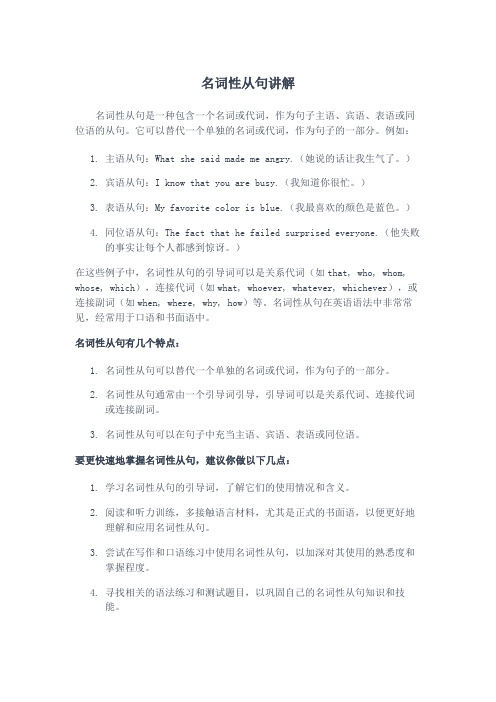
名词性从句讲解名词性从句是一种包含一个名词或代词,作为句子主语、宾语、表语或同位语的从句。
它可以替代一个单独的名词或代词,作为句子的一部分。
例如:1.主语从句:What she said made me angry.(她说的话让我生气了。
)2.宾语从句:I know that you are busy.(我知道你很忙。
)3.表语从句:My favorite color is blue.(我最喜欢的颜色是蓝色。
)4.同位语从句:The fact that he failed surprised everyone.(他失败的事实让每个人都感到惊讶。
)在这些例子中,名词性从句的引导词可以是关系代词(如that, who, whom, whose, which),连接代词(如what, whoever, whatever, whichever),或连接副词(如when, where, why, how)等。
名词性从句在英语语法中非常常见,经常用于口语和书面语中。
名词性从句有几个特点:1.名词性从句可以替代一个单独的名词或代词,作为句子的一部分。
2.名词性从句通常由一个引导词引导,引导词可以是关系代词、连接代词或连接副词。
3.名词性从句可以在句子中充当主语、宾语、表语或同位语。
要更快速地掌握名词性从句,建议你做以下几点:1.学习名词性从句的引导词,了解它们的使用情况和含义。
2.阅读和听力训练,多接触语言材料,尤其是正式的书面语,以便更好地理解和应用名词性从句。
3.尝试在写作和口语练习中使用名词性从句,以加深对其使用的熟悉度和掌握程度。
4.寻找相关的语法练习和测试题目,以巩固自己的名词性从句知识和技能。
名词性从句
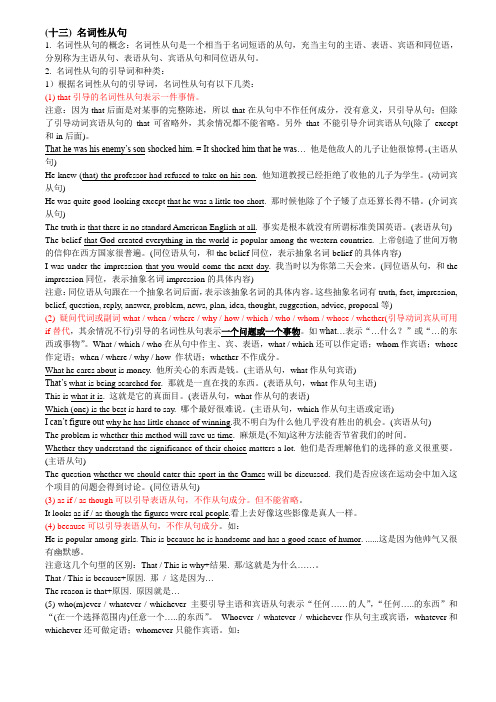
(十三) 名词性从句1. 名词性从句的概念:名词性从句是一个相当于名词短语的从句,充当主句的主语、表语、宾语和同位语,分别称为主语从句、表语从句、宾语从句和同位语从句。
2. 名词性从句的引导词和种类:1)根据名词性从句的引导词,名词性从句有以下几类:(1) that引导的名词性从句表示一件事情。
注意:因为that后面是对某事的完整陈述,所以that在从句中不作任何成分,没有意义,只引导从句;但除了引导动词宾语从句的that可省略外,其余情况都不能省略。
另外that不能引导介词宾语从句(除了except 和in后面)。
That he was his enemy’s son shocked him. = It shocked him that he was… 他是他敌人的儿子让他很惊愕。
(主语从句)He knew (that) the professor had refused to take on his son. 他知道教授已经拒绝了收他的儿子为学生。
(动词宾从句)He was quite good-looking except that he was a little too short. 那时候他除了个子矮了点还算长得不错。
(介词宾从句)The truth is that there is no standard American English at all. 事实是根本就没有所谓标准美国英语。
(表语从句) The belief that God created everything in the world is popular among the western countries. 上帝创造了世间万物的信仰在西方国家很普遍。
(同位语从句,和the belief同位,表示抽象名词belief的具体内容)I was under the impression that you would come the next day. 我当时以为你第二天会来。
什么是名词性从句
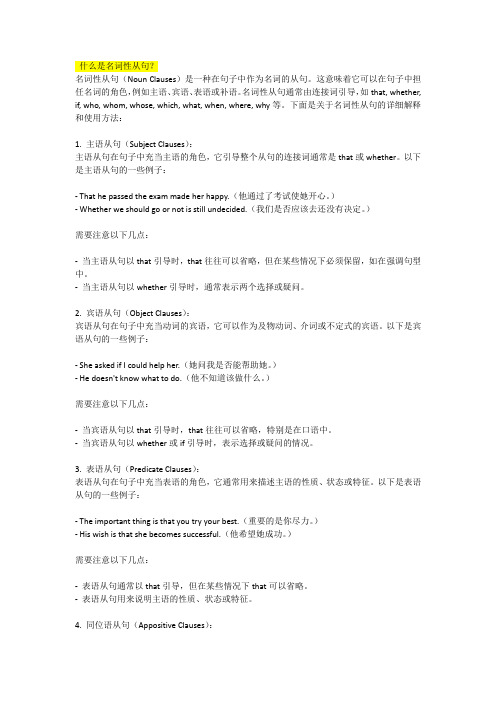
什么是名词性从句?名词性从句(Noun Clauses)是一种在句子中作为名词的从句。
这意味着它可以在句子中担任名词的角色,例如主语、宾语、表语或补语。
名词性从句通常由连接词引导,如that, whether, if, who, whom, whose, which, what, when, where, why等。
下面是关于名词性从句的详细解释和使用方法:1. 主语从句(Subject Clauses):主语从句在句子中充当主语的角色,它引导整个从句的连接词通常是that或whether。
以下是主语从句的一些例子:- That he passed the exam made her happy.(他通过了考试使她开心。
)- Whether we should go or not is still undecided.(我们是否应该去还没有决定。
)需要注意以下几点:-当主语从句以that引导时,that往往可以省略,但在某些情况下必须保留,如在强调句型中。
-当主语从句以whether引导时,通常表示两个选择或疑问。
2. 宾语从句(Object Clauses):宾语从句在句子中充当动词的宾语,它可以作为及物动词、介词或不定式的宾语。
以下是宾语从句的一些例子:- She asked if I could help her.(她问我是否能帮助她。
)- He doesn't know what to do.(他不知道该做什么。
)需要注意以下几点:-当宾语从句以that引导时,that往往可以省略,特别是在口语中。
-当宾语从句以whether或if引导时,表示选择或疑问的情况。
3. 表语从句(Predicate Clauses):表语从句在句子中充当表语的角色,它通常用来描述主语的性质、状态或特征。
以下是表语从句的一些例子:- The important thing is that you try your best.(重要的是你尽力。
(完整版)名词性从句
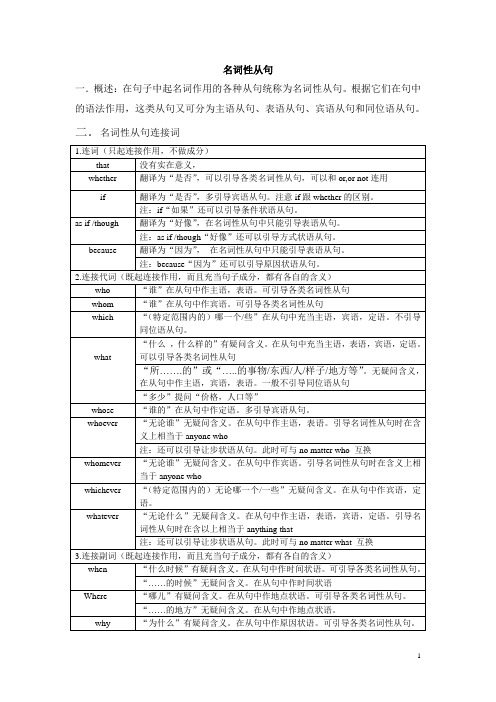
名词性从句一.概述:在句子中起名词作用的各种从句统称为名词性从句。
根据它们在句中的语法作用,这类从句又可分为主语从句、表语从句、宾语从句和同位语从句。
二.名词性从句连接词四.if, whether的区别1.引导主语从句时,如果主语从句放在句首,只能用whether不能用if引导,但是如果用it 做形式主语,而把主语从句放在句末时,也可以用if引导.2.引导宾语从句时常放在动词know, ask, care, wonder之后,if和whether均可。
少数动词,如: leave, put, discuss, doubt后的宾语从句常用whether. 。
3.在介词后面的宾语从句中,在表语从句、同位语从句中,表“是否”,只能用whether;4.whether和if都可以和or not连用,但是whether 之后可以直接跟or not,而if不可以。
I do n’t know whether or not I will stay.(只能用whether)5.在不定式前只能用whether.如:I can’t decide whether to stay. 我不能决定是否留下。
五.与“命令、要求、建议”等相关的名词性从句中通常用虚拟语气,虚拟语气的构成是“should+动词原形”或省去should,直接用动词原形。
六.名词性从句以考查引导词为主,同时考查时态,语序,与其它从句的区别以及混同虚拟语气的考查。
一.主语从句1.主语从句定义:在复合句中充当主语的句子叫做主语从句。
That he will succeed is certain.Whether wild life can be well protected is of great importance.Who will go makes no different.Which kind of food is the best is still not certain.What is needed for the space trip is careful preparation.Whoever comes is welcome.How we can help the twins will be discussed at the meeting.When they’ll start the project has not been decided yet.Where he hid the money is to be found out.Why dinosaurs died out remains a puzzle.2.主语从句引导词按照在句中是否做成分主要分为三类:连词that、whether、if 连接代词、连接副词。
- 1、下载文档前请自行甄别文档内容的完整性,平台不提供额外的编辑、内容补充、找答案等附加服务。
- 2、"仅部分预览"的文档,不可在线预览部分如存在完整性等问题,可反馈申请退款(可完整预览的文档不适用该条件!)。
- 3、如文档侵犯您的权益,请联系客服反馈,我们会尽快为您处理(人工客服工作时间:9:00-18:30)。
(5) it seems/happens+that 从句
众所周知的几种表达方式
(1)It is known to us that.
(2)As is known to us.
(3)what is known to us is that.
I want to know what he has told you. 我想知道他告诉了你什么。
She always thinks of how she can work well. 她总是在想怎样能把工作做好。
She will give whoever needs help a warm support. 凡需要帮助的人,她都会给予热情的支持。
其基本结构为:主语+ 联系动词+ that从句
1.that 引导表语从句,无词义,只起连接作用,不可省。
2.联系动词可为be,look,seem,sound,appear等。
3.主语可为名词fact,truth,cause,question,explanation,trouble,assumption,belief等,代词this,that,these,it等。
We take it that you will agree with us.我们认为你会同意我们的。
He will have it that our plan is really pratical.他认为我们的计划确实可行。
4.用whether或if引导的宾语从句,其主语和谓语的顺序也不能颠倒,仍保持陈述句语序。此外,whether与if 在作“是否”的意思讲时在下列情况下一般只能用whether,不用if:
②宾语从句放在句首表示强调时,只能用whether;
Whether this is true or not, I really don't know.这是否真实,我也不知道。
③引导表语从句,只能用whether;
The question is whether we can get in touch with her.问题是我们是否能联系上她。
Everything depends on whether we have enough money.一切要看我们是否有足够的钱。
⑤if与whether都可以与or not连用,但后面紧跟着or not时只能用whether;
We didn't know whether or not she was ready.(此时只能用whether)
据说他去过那儿很多次。
(4)It + 不及物动词 + that 从句[1]
另注意在主语从句中用来表示惊奇、不相信、惋惜、理应如此等语气时,谓语动词要用虚拟语气“(should) +do”,常用的句型有:
It is necessary (important, natural, strange, etc.) that …
I know (that) he has studied English since 1998. (从句用现在完成时)
当主句动词是过去时态(could, would除外),从句则要用相应的过去时态,如一般过去时,过去进行时,过去将来时等;当从句表示的是客观真理,科学原理,自然现象,则从句仍用现 在时态。
it引导的强调句结构:It is/was+被强调部分+that/who+句子其它部分。
eg:My father did the experiment in the lab yesterday evening.
பைடு நூலகம்
宾语从句
名词从句用作宾语的从句叫宾语从句。引导宾语从句的关联词与引导主语从句表语从句的关联词大致一样,在句中可以作谓语动词或介词及非谓语动词的宾语。
⑦用if会引起歧义时,只用whether;
Could you tell me if you know the answer ?
这句话有两种意思:“你能告诉我是否知道答案吗?”或“如果你知道答案,请告诉我,好吗?”。如用whether可避免歧义.
⑧whether可引导同位语从句,if不能引导同位语从句。
We must never think (that) we are good in everything while others are good in nothing. 我们决不能认为自己什么都好,别人什么都不好。
注意:在demand、order、suggest、decide、insist, desire, request, command, doubt等表示要求、命令、建议、决定等意义的动词后,宾语从句常用“(should)+ 动词原形”。
I feel it a pity that I haven't been to the get-together.我没去聚餐,感觉非常遗憾。
②.有些动词带宾语从句时需要在宾语与从句前加it,这类动词主要是:hate,take,owe,have,see to
I hate it when they with their mouths full of food.我讨厌他们满嘴食物时说话。
(1)It be+ 名词 + that从句
It's a great pity(that)they didn't get married.
他们没能结婚,真是令人惋惜。
It 's a good thing(that)you were insured.
你保了险,这可是件好事。
(2)It be + 形容词 + that从句
I know (that) he studies English every day. (从句用一般现在时)
I know (that) he studied English last term. (从句用一般过去时)
I know (that) he will study English next year. (从句用一般将来时)
①whether引导主语从句在句首时;
Whether there is life on the moon is an interesting question. 月球上有没有生命是个有趣的问题。
Whether he can come to the party on time depends on the traffic.他能否准时参加派对得看交通情况。
在句子中起名词作用的句子叫名词性从句 (Noun Clauses)。 名词性从句的功能相当于名词词组, 它在复合句中能担任主语、宾语、表语、同位语、介词宾语等,因此根据它在句中不同的语法功能,名词性从句又可分别称为主语从句、宾语从句、表语从句和同位语从句。
主语从句
主语从句通常由下列词引导:
1)从属连词that,whether,if等;
It's splendid that you passed your exam.
你通过考试了,真棒。
It's strange that there are no lights on.
真奇怪,没有一盏灯是开着的。
(3)It be + 动词的过去分词+ 主语从句
It's said that he has been there many times.
I wonder whether/if the news is true or not.(此时则二者都可以用)
⑥后接动词不定式时,用whether;
Can you tell me whether to go or to stay? 你能否告诉我是去还是留?
I can't decide whether to stay.我不能决定是否留下。
④引导介词宾语时,只能用whether;
His father is worried about whether he lose his work.他的父亲担心他是否会失去工作。
I'm thinking about whether I should quit my present job.我正在考虑我是否应该辞去现 在的工作。
What he wants to tell us is not clear. 他要跟我们说什么,还不清楚。
Who will win the match is still unknown. 谁能赢得这场比赛还不得而知。
It is known to us how he became a writer. 我们都知道他是如何成为一名作家的。
The question whether we should call in a specialist was answered by the family doctor.我们是否请专家由家庭医生来定。
5. 注意宾语从句中的时态呼应,当主句动词是现 在时,从句根据自身的句子情况,而使用不同时态。
The teacher told us that Tom had left us for America.
All of us know that the moon moves round the earth.
6. think, believe, imagine, suppose等等动词引起的否定性宾语从句中,要把上述主句中的动词变为否定式。即将从句中的否定形式移到主句中。
2)连接代词what,who,which,whatever,whoever,whom 等;
